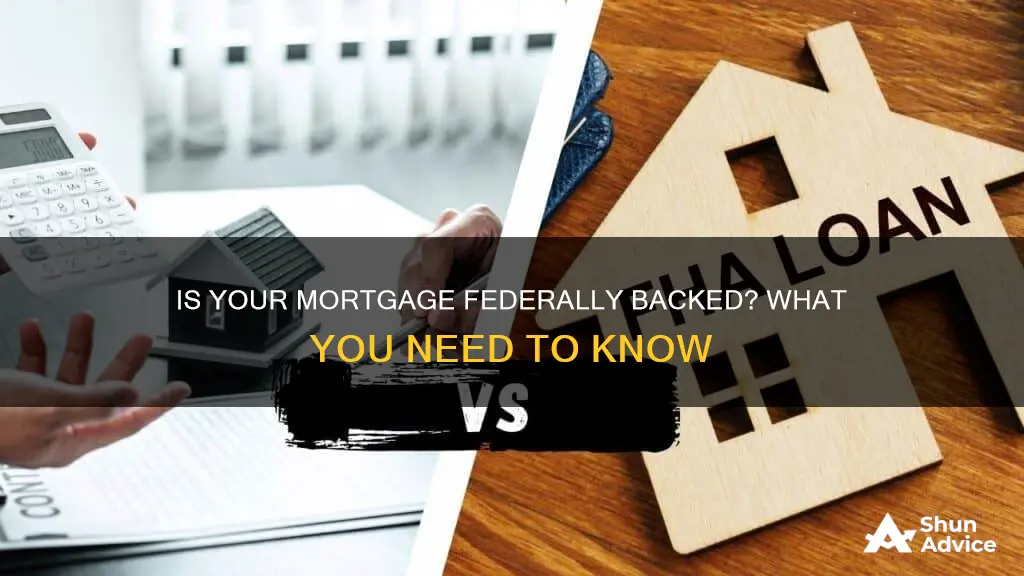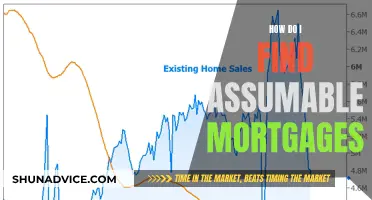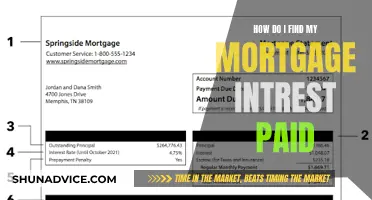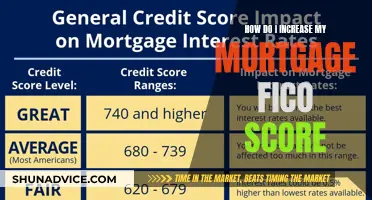
Federally-backed mortgages are those funded through government-sponsored entities (GSEs) and they make up about 50% of all mortgage loans in the US. There are several benefits to federally-backed mortgages, including different requirements for down payments and minimum credit scores, making them a good option for first-time buyers or those with poor credit history. To find out if your mortgage is federally-backed, you can use the Freddie Mac or Fannie Mae lookup tools, or call your loan servicer.
| Characteristics | Values |
|---|---|
| What is a federally-backed mortgage? | A mortgage loan funded through government-sponsored entities or GSEs. |
| How to find out if your mortgage is federally backed? | Call your mortgage company or look it up online. |
| What to do if your mortgage is federally backed? | Call your mortgage company and check a box that attests that you had a financial hardship, and you’re automatically granted up to 180 days forbearance. |
| What if your mortgage is not federally backed? | Your servicer is not required to follow the guidance in the CARES Act, but they are highly encouraged to do so. |
| Tools to find out if your mortgage is federally backed | Freddie Mac or Fannie Mae lookup tools. |
| Investors in federally-backed mortgages | Fannie Mae, Freddie Mac, Federal Housing Administration (FHA), Veterans Affairs (VA), and the U.S. Department of Agriculture’s Rural Home Service (RHS). |
What You'll Learn
- Federally-backed mortgages have different requirements for down payments and minimum credit scores
- Federally-backed mortgages are funded through government-sponsored entities (GSEs)
- The CARES Act applies to federally-backed mortgages
- If you don't know who owns your mortgage, call your mortgage company or look it up online
- Federally-backed mortgages are administered by traditional private lenders

Federally-backed mortgages have different requirements for down payments and minimum credit scores
FHA loans, for instance, have lower down payment and credit score requirements than conventional loans. While a credit score of 580 is generally considered the minimum to qualify for an FHA loan, some lenders may offer loans to those with credit scores as low as 500. The down payment for an FHA loan can be as low as 3.5% of the purchase price, but if your credit score is lower, you may need to make a larger down payment of at least 10%.
VA loans, on the other hand, typically don't require any down payment at all, but they are only available to eligible veterans, active-duty military personnel, National Guard personnel, reservists, and qualifying surviving spouses. While the VA doesn't have a minimum credit score requirement, individual lenders may have their own criteria.
USDA loans are available for those buying homes in suburban or rural areas and usually require a credit score of at least 640. These loans also don't require a down payment, making them more accessible to those with limited funds.
To find out if your mortgage is federally backed, you can contact your mortgage servicer, who is obligated to provide information about who owns your loan. You can also use online tools provided by organizations like the National Consumer Law Center to determine which investor backs your mortgage.
Locating Your HSBC Mortgage Account: A Quick Guide
You may want to see also

Federally-backed mortgages are funded through government-sponsored entities (GSEs)
Well-known GSEs in the mortgage market include the Federal National Mortgage Association, or Fannie Mae, and the Federal Home Loan Mortgage Corporation, Freddie Mac. Both agencies received federal assistance following the 2008 subprime mortgage crisis, and they remain under the control of the Federal Housing Finance Agency. Fannie Mae purchases mortgages from mortgage lenders, bundling and selling them to investors as mortgage-backed securities. Freddie Mac, on the other hand, funds credit unions, community banks, and other smaller lenders that support communities with less access to banking resources.
Another example of a mortgage GSE is Farmer Mac, which was created in 1988 to guarantee agricultural mortgage-backed securities purchased by investors. Farmer Mac purchases loans from rural lenders, packaging them for sale to investors, and helps free up cash and available loans for agricultural projects.
To determine if your mortgage is federally backed, you can contact your mortgage company or look it up online. Nearly half of the nation's mortgages are owned or backed by Fannie Mae or Freddie Mac, so these are good places to start. You can also use the tools provided by the National Consumer Law Center to determine which investor backs your mortgage loan.
Understanding Your Mortgage Payoff Amount: A Guide
You may want to see also

The CARES Act applies to federally-backed mortgages
The CARES Act, or the Coronavirus Aid, Relief, and Economic Security Act, was passed into law on March 27, 2020. It provides financial relief to borrowers with federally backed mortgages, including multifamily mortgages, and their tenants. The Act was designed to help those facing financial hardship due to the COVID-19 pandemic.
Under the CARES Act, borrowers with federally backed mortgages can request forbearance from their mortgage servicer. To do so, they must first attest that they are experiencing financial hardship due to the pandemic. No additional information or documentation is required to receive the forbearance. The initial period of forbearance is 30 days, with two additional 30-day periods available if certain conditions are met. During the forbearance period, no fees, penalties, or interest beyond the scheduled amounts can accrue on the borrower's account.
The CARES Act also provides relief for landlords with federally backed mortgage loans. It imposes a moratorium on the filing of any action to recover possession of a dwelling for nonpayment of rent or other fees. Landlords are also prohibited from issuing notices to vacate until after the expiration of the moratorium, and tenants cannot be required to vacate until at least 30 days after receiving such a notice.
It is important to note that the CARES Act only applies to federally backed mortgages. These include loans backed by Fannie Mae, Freddie Mac, Federal Housing Administration (FHA), Veterans Affairs (VA), and the U.S. Department of Agriculture's Rural Home Service (RHS). To determine if a loan is federally backed, individuals can use resources provided by the National Consumer Law Center to quickly identify which investor backs their mortgage loan.
Understanding Mortgage Basics: Holding Your Dream Home
You may want to see also

If you don't know who owns your mortgage, call your mortgage company or look it up online
If you don't know who owns your mortgage, there are several ways to find out. Firstly, you can call your mortgage company or servicer. Your mortgage servicer is the company that you send your mortgage payments to each month. They are obligated to provide you with the name, address, and telephone number of who owns your loan. You can find the number for your mortgage servicer on your monthly mortgage statement or coupon book. It may take a while to get through to a loan servicer, as they are experiencing a high call volume.
Another option is to send a written request to your mortgage servicer. You can send a Qualified Written Request or a Request for Information. You can also look up your mortgage servicer by searching the Mortgage Electronic Registration Systems (MERS) website. If you have a MERS loan, you can call the MERS Servicer Identification System toll-free on 888-679-6377.
There are also online tools you can use to look up who owns your mortgage. Nearly half of the nation's mortgages are owned or backed by Fannie Mae or Freddie Mac, and both offer a mortgage look-up tool on their websites. To determine if a loan is FHA-insured, look for an FHA case number on the mortgage document, specific language in the mortgage and note forms, or through the payment of an FHA premium on the mortgage statement. If you have questions about your loan's status, you can call HUD's National Servicing Center at 877-622-8525.
Avoid Mortgage Transfer: What You Need to Know
You may want to see also

Federally-backed mortgages are administered by traditional private lenders
Federally-backed mortgages offer several benefits, including different requirements for down payments and minimum credit scores, making them a desirable option for first-time homebuyers. Some federally-backed mortgage loans also waive the mortgage insurance premium (MIP), resulting in significant savings on monthly payments. However, it's important to understand that federally-backed loans have specific requirements for qualification, and not everyone will be eligible for these loans. For instance, only individuals with a history of serving in the armed forces or their spouses can qualify for a VA loan.
To determine if your mortgage is federally backed, you can use lookup tools provided by Freddie Mac and Fannie Mae, two government-sponsored entities (GSEs) that back about 50% of all mortgage loans in the US. You can also contact your loan servicer, who is legally required to disclose this information. Additionally, you can refer to the National Consumer Law Center's tools to quickly determine which investor backs your mortgage loan. This can include investors such as Fannie Mae, Freddie Mac, Federal Housing Administration (FHA), Veterans Affairs (VA), and the U.S. Department of Agriculture's Rural Home Service (RHS).
While federally-backed mortgages offer advantages, it's worth noting that they are not the only option. Loans backed by private companies also constitute a significant portion of the mortgage market. In some cases, your mortgage may be federally backed but administered by traditional private lenders like JP Morgan Chase or Wells Fargo. This adds a layer of complexity to the mortgage landscape, as you may need to navigate the policies and procedures of both the federal backing and the private administration.
If you're experiencing financial hardship, particularly due to events like the COVID-19 pandemic, understanding the backing of your mortgage becomes crucial. During such challenging times, federally-backed mortgages can provide relief through forbearance plans and deferred payments. The CARES Act, for example, was specifically designed to assist homeowners with federally-backed mortgages, allowing them to postpone payments for an extended period. While lenders with non-federally-backed mortgages are encouraged to follow similar guidelines, it is not mandatory. Therefore, knowing whether your mortgage is federally backed can empower you to make informed decisions and explore the most suitable options for your financial situation.
Generate Mortgage Leads: Strategies for Success
You may want to see also
Frequently asked questions
You can use the Freddie Mac or Fannie Mae lookup tools to find out if your loan is federally backed. You can also call your loan servicer to ask (they are required by law to tell you).
Federally-backed mortgages often have different requirements for down payments and minimum credit scores. This makes them a desirable option for first-time homebuyers without a lot of cash or those with a history of less-than-perfect credit.
There are five different types of federally-backed mortgages: FHA, VA, USDA, RHS, and those backed by GSEs (government-sponsored entities).







